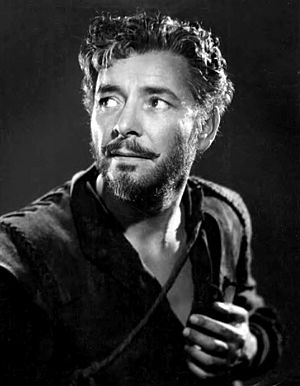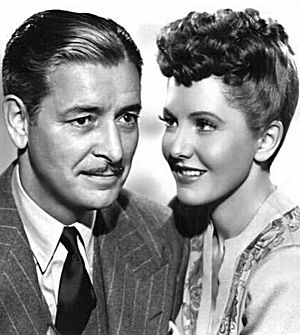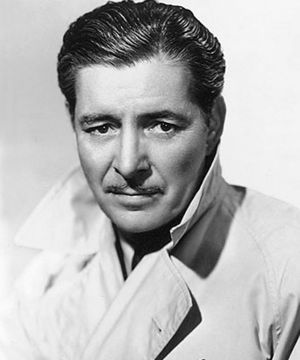Ronald Colman facts for kids
Ronald Charles Colman (born February 9, 1891 – died May 19, 1958) was a famous English actor. He began his acting career in plays and silent films in England. Later, he moved to the United States and became a big star in Hollywood movies.
Colman was very popular in the 1920s, 1930s, and 1940s. He was nominated for an Academy Award (Oscar) several times. He won an Oscar for Best Actor in 1947 for the movie A Double Life. He also won a Golden Globe Award for the same film.
He starred in many classic movies. These include A Tale of Two Cities (1935), Lost Horizon (1937), and The Prisoner of Zenda (1937). He also appeared in Kismet (1944) with Marlene Dietrich.
Ronald Colman was one of the first people to get a star on the Hollywood Walk of Fame. He received one star for his movie work and another for his television work.
Contents
Early Life and Education
Ronald Charles Colman was born in Richmond, Surrey, England. This was on February 9, 1891. He was the fifth child in his family. His father, Charles Colman, was a silk merchant.
He went to a boarding school in Littlehampton. There, he found out he loved acting, even though he was shy. He had planned to study engineering at Cambridge University. However, his father passed away suddenly in 1907. This made it impossible for him to afford university.
Colman became a well-known amateur actor. He was part of the West Middlesex Dramatic Society from 1908 to 1909. He first acted on a professional stage in 1914.
First World War Service
Before becoming a full-time actor, Ronald Colman worked as a clerk. He joined the London Scottish Regiment in 1909 as a soldier in the Territorial Army.
When World War I began, he was sent to France in September 1914. On October 31, 1914, during the Battle of Messines, Colman was badly hurt. A piece of shrapnel hit his ankle. This injury caused him to have a limp. He tried to hide this limp throughout his acting career. Because of his injury, he was sent home from the army in 1915.
Some other famous Hollywood actors also served with the London Scottish in the war. These included Claude Rains, Herbert Marshall, Cedric Hardwicke, and Basil Rathbone.
Acting Career
Theatre Work

After his war injuries, Colman recovered enough to act again. In 1916, he appeared in a play called The Maharani of Arakan in London. He continued to act in various plays in London theatres.
In 1920, Colman moved to America. He toured with different actors in plays like The Dauntless Three and East Is West. In 1921, he played a Temple Priest in The Green Goddess in New York City. His last stage role was in 1922, where he played Alain Sergyll in La Tendresse. This play was a big success for him.
Film Success

Ronald Colman first acted in British films in 1917 and 1919. While he was acting on stage in New York, director Henry King saw him. King chose Colman to star in the 1923 film The White Sister, alongside Lillian Gish. This movie made him an instant success. After this, Colman mostly focused on films instead of stage plays.
He became a very popular silent film star. He was known for romantic and adventure movies. Some of his famous silent films include The Dark Angel (1925), Stella Dallas (1926), and Beau Geste (1926). Colman had dark hair and eyes. He was also very athletic and did most of his own stunts. People often compared him to Rudolph Valentino.
Even though he was a huge silent film star, his greatest talent was his voice. When talking pictures (movies with sound) came out, his "beautifully modulated and cultured voice" became a big asset. Colman was often seen as a smooth, English gentleman. His voice made him seem chivalrous and polite. Film critic David Shipman said Colman was "the dream lover – calm, dignified, trustworthy."
His first big success in a talkie was in 1930. He was nominated for an Oscar for his roles in Condemned and Bulldog Drummond. He then starred in many other important films. These include Raffles (1930), A Tale of Two Cities (1935), and Lost Horizon (1937). He won the Best Actor Oscar in 1948 for A Double Life.
Radio and Television
Ronald Colman also used his famous voice in radio shows. In 1942, he joined other Hollywood stars to start international radio broadcasts for CBS. This helped spread American culture in South America during World War II.
On D-Day (June 6, 1944), Colman read a special poem and prayer for the invading army on NBC radio.
Starting in 1945, Colman often appeared on The Jack Benny Program radio show. He was usually with his second wife, Benita Hume. They played Jack Benny's funny next-door neighbors. This led to their own radio comedy show, The Halls of Ivy, from 1950 to 1952. On this show, the Colmans played a college president and his former-actress wife.
The Halls of Ivy was on NBC radio from 1950 to 1952. Then, it moved to CBS television for the 1954–55 season. Colman also hosted and sometimes starred in the radio show Favorite Story (1946–49). He famously narrated and played Scrooge in a 1948 radio version of A Christmas Carol.
Later Life and Death
In 1957, Ronald Colman had surgery for a lung infection. After that, his health was not good. He passed away on May 19, 1958, at the age of 67. He died from a severe lung condition called emphysema in Santa Barbara, California. He was buried in the Santa Barbara Cemetery. He had one daughter, Juliet Benita, with his second wife, Benita Hume.
Awards and Legacy
Ronald Colman was nominated for the Academy Award for Best Actor three times. He received a nomination in 1929 for his roles in Bulldog Drummond and Condemned. He was nominated again in 1942 for Random Harvest. He finally won the Oscar in 1948 for A Double Life. In this film, he played an actor who starts to believe he is the character Othello. He also won the Golden Globe Award for A Double Life in 1947.
Colman also received the George Eastman Award. This award is given for important contributions to the art of film.
He has two stars on the Hollywood Walk of Fame in Los Angeles. One is for his movies, and the other is for his television work.
His daughter, Juliet Benita Colman, wrote a book about him in 1975. It was called Ronald Colman: A Very Private Person.
In Dublin, Ireland, the slang term "ronnie" means a moustache. This term comes from Ronald Colman's thin moustache.
Filmography
| Year | Program | Episode/source |
|---|---|---|
| 1945 | Suspense | "August Heat" |
| 1945 | Suspense | "The Dunwich Horror" |
| 1946 | Academy Award | Lost Horizon |
| 1946 | Encore Theatre | Yellowjack |
| 1952 | Lux Radio Theatre | Les Misérables |
| 1953 | Suspense | Vision of Death |
See also
 In Spanish: Ronald Colman para niños
In Spanish: Ronald Colman para niños
- List of actors with Academy Award nominations
 | Kyle Baker |
 | Joseph Yoakum |
 | Laura Wheeler Waring |
 | Henry Ossawa Tanner |


